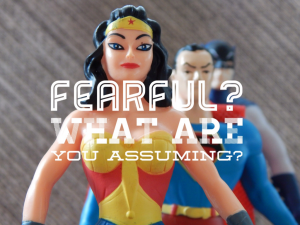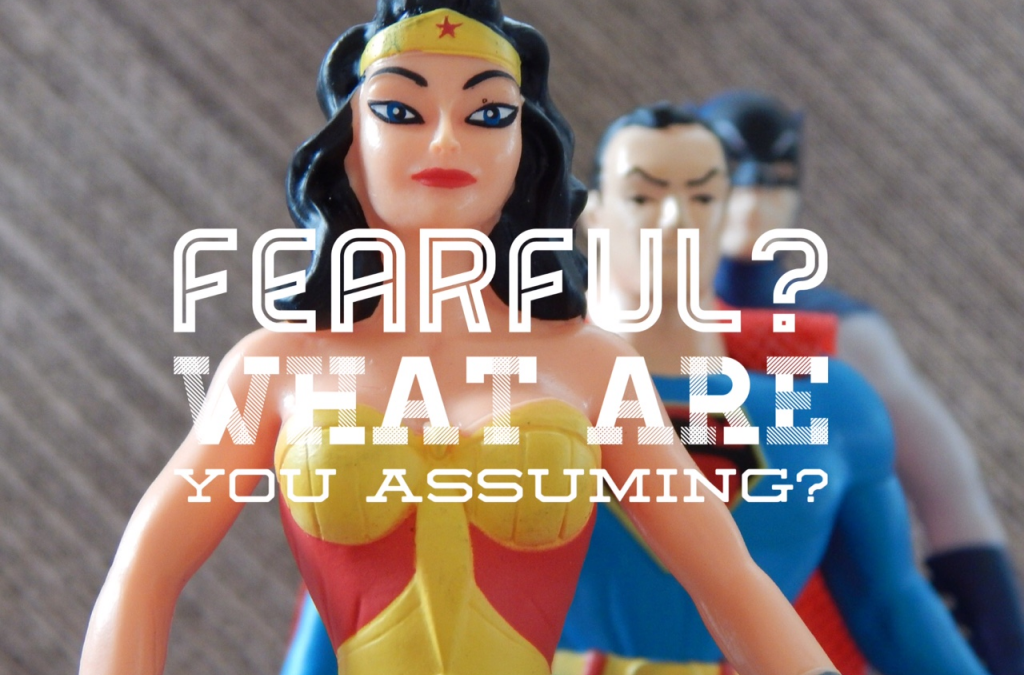Fearful? What are you assuming?
 When I was 17 I thought nothing of walking a mile home by myself after a post-pub curry late on a Friday night. 19 years later, I felt afraid running solo along a country lane close to home on a bright, clear-skyed Sunday morning. Booze and youth, the critical difference?
When I was 17 I thought nothing of walking a mile home by myself after a post-pub curry late on a Friday night. 19 years later, I felt afraid running solo along a country lane close to home on a bright, clear-skyed Sunday morning. Booze and youth, the critical difference?
When I decided to write this post I thought I was going to invite you to take a moment to reflect on where in your life fear might not be justified and what extra joy, professional gain, sense of achievement or social justice you might bring about if you put it to one side. What I’ve actually written about is assumptions and how to challenge them.
Back to the run. It was a great run all in all but half way round I decided to go up a narrow country lane that’s known for fly-tipping. Ahead of me I spotted two parked cars and the heads of three youngish men smoking. Something in me said “just don’t” and I slowed, took my headphones off and thought “no, I’ve every right to run up here and if they are fly-tipping they probably won’t give two hoots about me seeing them” but then my body turned and took me away. I think the narrative I had quickly constructed was that it being so early in the morning they may still be giddy with excitement and possibly intoxicated that anything could happen if they saw a woman out by herself where no one would hear her scream. Reading this back it seems absolutely ridiculous and I realise it may have more to do with me just finishing Tony Parson’s ‘The Murder Bag’ than anything else. I’m curious as to how aware you are of what might be clouding your thinking? And what helps you to get clear and make ‘good decisions’?
I once heard fear described as ‘false evidence appearing real’ and when I think about this, the word ‘assumption’ jumps forward in my mind. It’s human nature to join dots and make predictions and it can be life-saving to do so, although for many of the people I work with, assumptions often turn out to be really quite unhelpful.
Some of the most pernicious assumptions we hold are about how people will respond to us if we do or say X or Y thing and this is often a theme for the coachees I work with. We can build lengthy narratives in our minds about how badly things will unfold and the dire implications that will follow – and because we can conjure up great detail in these internal stories, it’s unsurprising they feel so real. In short, we’re deluding ourselves in the most unhelpful way.
In theory, if we’re capable of holding false evidence that takes us down an avenue of doom, it’s possible to delude ourselves into a brilliant upward spiral. Imagine assuming your line manager would be delighted if you told her you’d like to have her job in two years time, that a pay rise is in order and that you will be going off on maternity leave in five months time. [Just writing these words has made me sit up straighter and smile. Positive assumptions rock!] And how about assuming family will understand and be excited at the prospect of a change this Christmas (because you won’t be playing host and feeding them all). And imagine you are considering relocating; let’s assume that friendships will be strengthened by you choosing to move away, rather than diminished. The point is, assumptions drive behaviour and holding optimistic assumptions about our relationships is likely to lead to positive outcomes.
When we’re exploring assumptions in a coaching session we ask questions to unpick them:
- Is the assumption helpful to you?
- What are the facts?
- What other ways could we interpret the facts?
- What might other people think in the same situation?
- How could we test the assumption?
- Is there a different, more helpful assumption you could try out?
What assumptions have you made lately with colleagues, family and friends? To what extent did those assumptions prove useful to you? Did you experience an increase in joy, satisfaction or fulfilment as a result? If not, perhaps you could self-coach yourself to a more optimistic approach about what might be.










